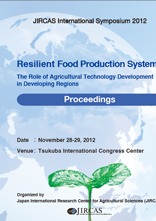Welcome Statements

Hello everyone. My name is Saigo. I am Research Councilor of the secretariat of Agriculture, Forestry and
Fisheries Research Council (AFFRC) of MAFF. It is my great pleasure to say a few words at the opening of the
JIRCAS International Symposium 2012. As Dr. Iwanaga has just mentioned, we are beset with a significant
population increase globally, and there has been economic development of some developing countries, as well as
increasing demand for biofuel, which is driving up global demand for agricultural products. Adding to this
challenge is climate change and biodiversity, which are also having an impact. Therefore, agricultural production
is beset with significant pressures today.
As already mentioned, in the United States this year there were events of high temperatures as well as droughts,
which are driving up global food prices. In developing nations, the price volatility as well as climate change and
changes in the social environment will exert enormous pressure because they are vulnerable to such changes.
International forums have been held within the political world as well as research areas. For example, in May of
this year in Kazan, Russia, the APEC Food Security Ministerial Meeting was held. During this meeting the APEC
Kazan Declaration on Food Security was adopted. Research and development in the agriculture areas as well as
strengthening the capacity of researchers in the developing nations were identified to be important challenges
going forward. Against this backdrop, we must strengthen the resilience of food production against climate
change as well as natural disasters. We must achieve this by having researchers working together globally.
With respect to Japan, the grand design for food production is the basic plan for food agriculture and agricultural
villages. It has been emphasized that we will contribute to the world’s food security by providing technical
cooperation to developing nations as well as contributing to the global environmental issues through actively
implementing research and development globally. In the basic plan for AFFRC, we are emphasizing the need to
implement technological development to tackle the issues of poverty and hunger, as well as the global
environmental issues. However, this cannot be implemented by one country alone, and therefore we hope that we
can make available the technologies we have developed in Japan for the purpose of international research.
In Japan, because we have limited land we have always used land in a multifaceted way. We have been managing
agriculture as well as national resources. I believe that people in Japan have utilized the benefit of the ecological
environment, and this is evaluated very highly. Recently, the FAO has established the so-called “World
Agriculture Heritage” to showcase the traditional agriculture methods utilizing the local environment as well as
for the land-utilization system by protecting biodiversity. Satoyama of Noto and Sado have been designated a
world agricultural heritage.
The multi-functionality of agriculture is very rooted in Japan, and eco-service preservation, a more modern term, is now often used, which means that we have always placed emphasis on the traditional technologies prevailing
in our country. At the same time, this is also bringing about resilience against natural disasters. So this is not just
traditional technology but has to be based on scientific knowledge as well. We would like to utilize our experience
as well as technologies to enhance the resilience for developing nations. In terms of the global research efforts,
The Global Research Alliance (GRA) has been promoted by New Zealand from 2011. Furthermore, one of the
research programs of CGIAR is the CCAFS. Agricultural research for climate change has been pursued. Japan is
taking a proactive role in these frameworks. For example, in the rice paddy group of the GRA, one of our
researchers from Japan who is present here today is serving as the joint chairman. JIRCAS, the organizer of
today’s event, has been very active in developing nations to pursue comprehensive research in the areas of
agriculture, forestry, and fisheries. It is also serving as a focal point in the CGIAR, working together with the
international agricultural research organizations as well as international institutions, making contributions.
For this symposium, we have participants who are responsible in the area of research and development, as well
as from the government in the area of agriculture. We will be sharing the results of research and engaging in
discussions regarding how we can enhance resilience for a better food production system, as well as discussing
issues prevailing in Asia and African continents. That is the reason why we have to focus on the substance of
these efforts to make this more meaningful.
I hope that significant discussions can take place during this symposium. On the part of MAFF, the result of the
discussions of the symposium will be brought to bear in our activities. In closing, I would like to express my hope
for the success of this symposium, and also express my gratitude and respect to the organizers and the people who
are engaged in research. Thank you.
| Date of issued | |
|---|---|
| Creator | Masamichi Saigo |
| Publisher | Japan International Research Center for Agricultural Sciences |
| Available Online | |
| Issue | 2012 |
| spage | 9 |
| epage | 10 |
| Rights | Japan International Research Center for Agricultural Sciences |
| Language | eng |
